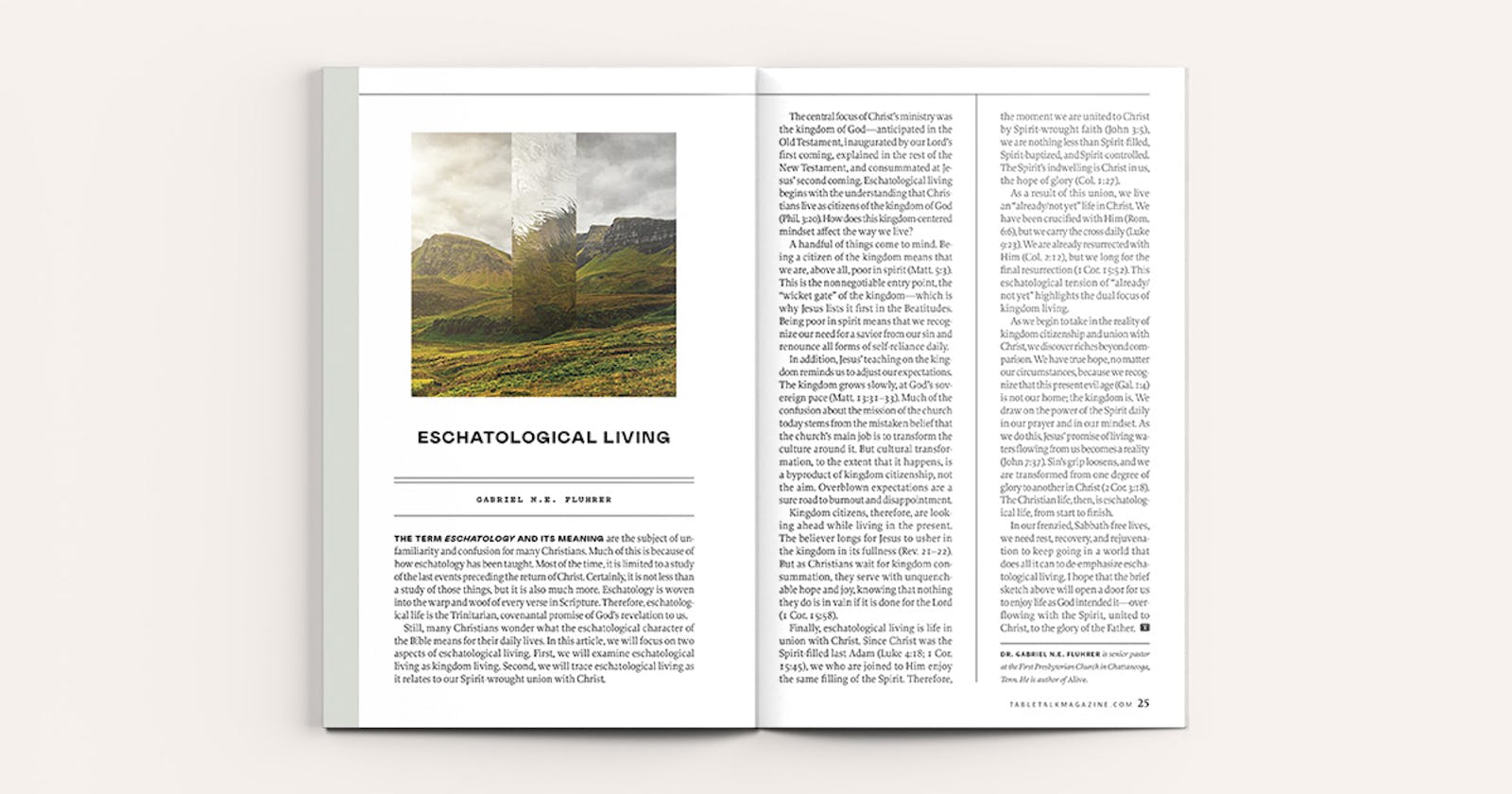
Request your free, three-month trial to Tabletalk magazine. You’ll receive the print issue monthly and gain immediate digital access to decades of archives. This trial is risk-free. No credit card required.
Try Tabletalk NowAlready receive Tabletalk magazine every month?
Verify your email address to gain unlimited access.
The term eschatology and its meaning are the subject of unfamiliarity and confusion for many Christians. Much of this is because of how eschatology has been taught. Most of the time, it is limited to a study of the last events preceding the return of Christ. Certainly, it is not less than a study of those things, but it is also much more. Eschatology is woven into the warp and woof of every verse in Scripture. Therefore, eschatological life is the Trinitarian, covenantal promise of God’s revelation to us.
Still, many Christians wonder what the eschatological character of the Bible means for their daily lives. In this article, we will focus on two aspects of eschatological living. First, we will examine eschatological living as kingdom living. Second, we will trace eschatological living as it relates to our Spirit-wrought union with Christ.
The central focus of Christ’s ministry was the kingdom of God—anticipated in the Old Testament, inaugurated by our Lord’s first coming, explained in the rest of the New Testament, and consummated at Jesus’ second coming. Eschatological living begins with the understanding that Christians live as citizens of the kingdom of God (Phil. 3:20). How does this kingdom-centered mindset affect the way we live?
A handful of things come to mind. Being a citizen of the kingdom means that we are, above all, poor in spirit (Matt. 5:3). This is the nonnegotiable entry point, the “wicket gate” of the kingdom—which is why Jesus lists it first in the Beatitudes. Being poor in spirit means that we recognize our need for a savior from our sin and renounce all forms of self-reliance daily.
In addition, Jesus’ teaching on the kingdom reminds us to adjust our expectations. The kingdom grows slowly, at God’s sovereign pace (Matt. 13:31–33). Much of the confusion about the mission of the church today stems from the mistaken belief that the church’s main job is to transform the culture around it. But cultural transformation, to the extent that it happens, is a byproduct of kingdom citizenship, not the aim. Overblown expectations are a sure road to burnout and disappointment.
Kingdom citizens, therefore, are looking ahead while living in the present. The believer longs for Jesus to usher in the kingdom in its fullness (Rev. 21–22). But as Christians wait for kingdom consummation, they serve with unquenchable hope and joy, knowing that nothing they do is in vain if it is done for the Lord (1 Cor. 15:58).

Finally, eschatological living is life in union with Christ. Since Christ was the Spirit-filled last Adam (Luke 4:18; 1 Cor. 15:45), we who are joined to Him enjoy the same filling of the Spirit. Therefore, the moment we are united to Christ by Spirit-wrought faith (John 3:5), we are nothing less than Spirit-filled, Spirit-baptized, and Spirit-controlled. The Spirit’s indwelling is Christ in us, the hope of glory (Col. 1:27).
As a result of this union, we live an “already/not yet” life in Christ. We have been crucified with Him (Rom. 6:6), but we carry the cross daily (Luke 9:23). We are already resurrected with Him (Col. 2:12), but we long for the final resurrection (1 Cor. 15:52). This eschatological tension of “already/not yet” highlights the dual focus of kingdom living.
As we begin to take in the reality of kingdom citizenship and union with Christ, we discover riches beyond comparison. We have true hope, no matter our circumstances, because we recognize that this present evil age (Gal. 1:4) is not our home; the kingdom is. We draw on the power of the Spirit daily in our prayer and in our mindset. As we do this, Jesus’ promise of living waters flowing from us becomes a reality (John 7:37). Sin’s grip loosens, and we are transformed from one degree of glory to another in Christ (2 Cor. 3:18). The Christian life, then, is eschatological life, from start to finish.
In our frenzied, Sabbath-free lives, we need rest, recovery, and rejuvenation to keep going in a world that does all it can to de-emphasize eschatological living. I hope that the brief sketch above will open a door for us to enjoy life as God intended it—overflowing with the Spirit, united to Christ, to the glory of the Father.
